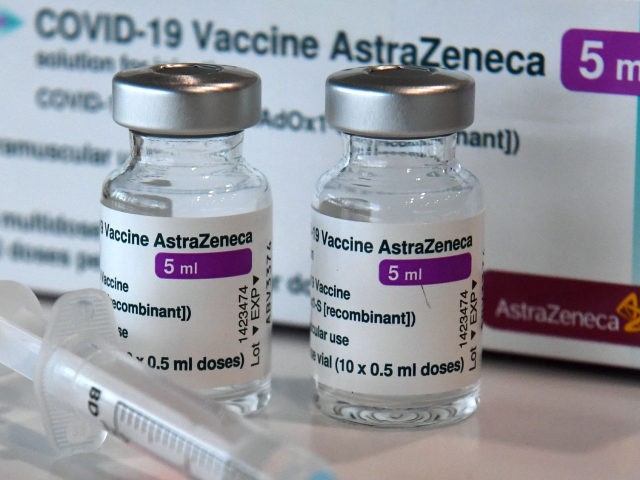A study by a Spanish clinical institute, local media reported Tuesday, found that administering one dose of the Chinese coronavirus vaccine by European firm AstraZeneca and one of the vaccine by American company Pfizer is “safe and effective.”
Pfizer’s product, developed in conjunction with European company BioNTech, enjoys one of the world’s best reputations in fighting coronavirus disease. Clinical trials found it to be as high as 95-percent effective against coronavirus infections. In contrast, the AstraZeneca product tested at 76-percent efficacy when only counting symptomatic cases and has been the subject of controversy over evidence it may cause rare blood clots in some patients.
The Spanish government initially approved the use of AstraZeneca vaccines on people younger than 60 years old, then abruptly halted the product’s distribution in light of the potential of blood clots in patients. At the time of the pause, most of those receiving the vaccine were health workers and others deemed essential to the economy. The pause left about 1.5 million Spaniards half-vaccinated, as AstraZeneca requires two doses of its product for it to reach its full efficacy.
The Carlos III Health Institute ran a study on mixing AstraZeneca’s product with Pfizer’s to see if the “vaccine cocktail,” as this mixing is referred to, could offer a solution to the problem.
“The study — in which five hospitals in Madrid, Bilbao, and Barcelona have participated — concludes that the side effects are light and very similar to those produced by a second dose of AstraZeneca and that the protection that a second jab of Pfizer offers could even be greater,” Spain’s El País reported Tuesday. The study tracked results in 672 participants.
The results may yield a conclusion to an increasingly heated political dispute between the Spanish government and regional officials demanding that the Public Health Commission, the top advisory body on coronavirus vaccination, offer a solution to resolve the incomplete vaccination status of over a million doctors, police officers, firefighters, and other essential workers. Those questioning the halt to the vaccination process and the new vaccine cocktail study point to the fact that the World Health Organization (W.H.O.) and the European Medicines Agency recommend that those who have already received one dose of the product complete the vaccination process, even if their respective countries have rescinded approval for the AstraZeneca vaccine.
According to El País, the Spanish Public Health Commission is expected to decide if the limited study from the Carlos III Institute is enough to administer a dose of Pfizer vaccine to the affected patients this week, possibly as soon as Tuesday afternoon local time.
The Spanish study is the second in a small but growing body of clinical trial results on mixing vaccines. A similar trial also blending doses of Pfizer and AstraZeneca vaccines conducted in the United Kingdom and published last week found no safety concerns, but an increase in “mild to moderate” side effects like fevers and fatigue. The results of other similar experimentation is pending at press time. Chinese authorities, for example, greenlit the mixing of vaccines by different companies in late April, but only under unspecified “special conditions,” and have not disclosed any findings or even how many people have undergone this process.
The rapid development of several vaccine candidates to fight Chinese coronavirus in the past year has led to much speculation regarding mixing different products. In the case of Pfizer and AstraZeneca, the products were developed with significantly different technology, leading to concerns about how they may work together. The Pfizer vaccine, similar to the product developed by fellow American firm Moderna, uses mRNA technology, which triggers an immune response using a “spike protein” and no part of the actual Chinese coronavirus. The AstraZeneca product uses adenovirus, a relatively common pathogen that causes mild respiratory illness, to carry coronavirus genetic material into a person’s body, prompting the creation of antibodies.
Health officials warned against mixing vaccine products by different manufacturers in early 2021, when government authorities around the world first began approving them for wide distribution (with the exception of “Sputnik V,” a Russian product, which leader Vladimir Putin approved in August 2020 prior to it completing clinical trials). Even in January, however, the Associated Press cited experts saying that “a mismatched dose is better than partial protection.”
Pfizer partner BioNTech revealed in April that it is considering the possibility of offering Chinese citizens a “cocktail” of the Pfizer vaccine with a dose of Chinese-made vaccines, which use either the adenovirus vector approach or inactivated coronavirus, as most traditional vaccines do. China has not yet approved the distribution of any foreign-made vaccine in the country but has hinted at approving Pfizer’s product soon, a moral defeat for the Communist Party given its global campaign to sell the less effective products by domestic companies like Sinopharm and Sinovac Biotech.
Chinese officials have expressed concern that its products pale in comparison to the success rate of the mRNA vaccines — those by Pfizer and Moderna. In April, the director of the Chinese Center for Disease Control (CDC) Gao Fu admitted publicly that Chinese-made vaccines “don’t have very high protection rates” and expressed hope that mRNA products would soon make it to China. Gao later called coverage of his embarrassing remarks a “complete misunderstanding” and emphasized his desire to see the creation of a Chinese-made mRNA vaccine.
The Russian Gamaleya Institute, responsible for “Sputnik V,” has also floated the possibility of mixing its product with other approved vaccines. Gamaleya refers to Sputnik V itself, which requires two doses, as a “vaccine cocktail” because it uses two different adenoviruses as vectors in each dose.


COMMENTS
Please let us know if you're having issues with commenting.